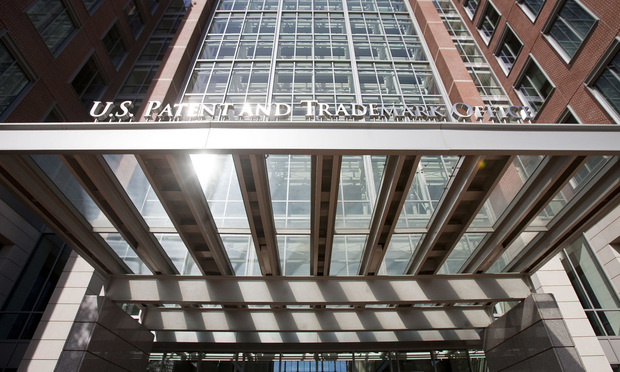High Court Rejects Challenge to PTO Patent Validity Review With Caveats Added
But the justices suggest procedure might not cover patents issued before 2011 passage of America Invents Act.
April 24, 2018 at 10:46 AM
5 minute read

The U.S. Supreme Court on Tuesday turned back a constitutional challenge to inter partes review, the administrative procedure for challenging patent validity at the U.S. Patent and Trademark Office.
IPRs, as they are known, can be decided in executive agencies rather than Article III courts because patents are public rights, not private rights, Justice Clarence Thomas wrote for a 7-2 majority. Plus the PTO is essentially reconsidering its decision to issue a patent in the first place. “Congress has permissibly reserved the PTO's authority to conduct that reconsideration,” Thomas wrote in Oil States Energy Services v. Greene's Energy. “Thus, the PTO can do so without violating Article III.”
The decision removes a cloud that's been hanging over the Patent Trial and Appeal Board since the Supreme Court granted certiorari last spring. It will probably lead to a bump in filing activity, as a lot of would-be petitioners have been waiting for the case's outcome, said Latham & Watkins partner Robert Steinberg, the outgoing president of the PTAB Bar Association.
But it does not mean business as usual. Thomas' opinion came with a couple of big caveats, including that the decision does not necessarily cover patents issued before the 2012 passage of the America Invents Act, which created the IPR process. “Nor has Oil States raised a due process challenge,” Thomas added. “Finally, our decision should not be misconstrued as suggesting that patents are not property for purposes of the due process clause or the takings clause.”
Justice Neil Gorsuch dissented along with Chief Justice John Roberts.
Foley & Lardner partner Christopher Kise had the winning argument for Greene's Energy. He said he wasn't surprised that Thomas wrote the majority opinion. He said he had developed some of the briefing and arguments with Thomas in mind, given observations the justice had made in past dissents. “We believed he would adhere to his prior views as to the history and nature of patent rights in the United States,” Kise said.
Deputy Solicitor General Malcolm Stewart also argued in support of Greene's Energy and the PTO. Morgan, Lewis & Bockius partner Allyson Ho represented Oil States.
The Oil States decision shifted the spotlight to a companion case also issued Tuesday, SAS Institute v. Iancu. In that case the court did order significant changes to how the Patent Trial and Appeal Board adjudicates validity challenges.
Under PTO rules, the board had the option of picking and choosing from an IPR petition, which challenged patent claims it believed to be worthy of adjudication. The court ruled 5-4 that AIA requires the board to adjudicate all of the claims challenged in a petition if it decides to review any.
“Whatever its virtues or vices, Congress's prescribed policy here is clear: the petitioner in an inter partes review is entitled to a decision on all the claims it has challenged,” Gorsuch wrote in SAS.
Jones Day partner Gregory Castanias, who had the winning argument for SAS, said the decision will ultimately force petitioners to choose between the PTAB and district court. “The claims are likely to be litigated in a single stop, rather than in a piecemeal fashion,” he said.
“It's going to be a new era at the PTAB,” Steinberg said.
Former PTO Director Michelle Lee said the decision will add to the expense of litigating IPRs, both for the PTAB and litigants. “You're just pushing forward a larger case,” she said. But Lee added that the decision might lead to efficiencies in patent litigation overall if, for example, district courts will now be more likely to stay parallel litigation.
The Oil States constitutional challenge was years in the making. The AIA reorganized the Patent Trial and Appeal Board (PTAB) and gave it the power to re-evaluate the validity of previously issued patents. The PTAB began conducting inter partes review—an adversary proceeding that culminated in an oral hearing before a tribunal of three PTAB judges—in 2012.
The proceedings quickly became popular with companies accused of patent infringement. IPRs proved to be a quick, inexpensive way to challenge patent validity. It's considered one of the primary patent reforms that have reduced the leverage of nonpracticing entities—sometimes called patent trolls.
Patent owners quickly began raising constitutional arguments. Oil States argued that IPRs bear all of the hallmarks of litigation, but without its constitutional safeguards. Instead of life-tenured judges presiding over a panel of impartial jurors, IPRs are decided by administrative judges beholden to the expediences of the executive branch, they argued.
Gorsuch picked up those themes in his dissent. “Today, the government invites us to retreat from the promise of judicial independence,” he wrote. “Until recently, most everyone considered an issued patent a personal right—no less than a home or farm—that the federal government could revoke only with the concurrence of independent judges.”
Thomas disagreed. “Patents convey only a specific form of property right—a public franchise,” he wrote.
With the decision in the books, Lee said the focus is likely to shift back to PTO rules governing IPRs. “You're going to see stakeholders turn to the agency for refinements,” she said, “and that's appropriate to make them stronger and fairer.”
As for both decisions, PTO spokesman Paul Fucito said the agency is “carefully considering the Supreme Court's decisions and determining their impact on various proceedings at the PTAB.”
Read the decision:
This content has been archived. It is available through our partners, LexisNexis® and Bloomberg Law.
To view this content, please continue to their sites.
Not a Lexis Subscriber?
Subscribe Now
Not a Bloomberg Law Subscriber?
Subscribe Now
NOT FOR REPRINT
© 2025 ALM Global, LLC, All Rights Reserved. Request academic re-use from www.copyright.com. All other uses, submit a request to asset-and-logo-licensing@alm.com. For more information visit Asset & Logo Licensing.
You Might Like
View All
Lavish 'Lies' Led to Investors Being Fleeced in Nine-Figure International Crypto Scam
3 minute read
SEC Puts Beat Down on Ex-Wrestling CEO Vince McMahon for Not Reporting Settlements
3 minute read
DOJ Files Antitrust Suit to Block Amex GBT's Acquisition of Competitor
Trending Stories
- 1'It's Not Going to Be Pretty': PayPal, Capital One Face Novel Class Actions Over 'Poaching' Commissions Owed Influencers
- 211th Circuit Rejects Trump's Emergency Request as DOJ Prepares to Release Special Counsel's Final Report
- 3Supreme Court Takes Up Challenge to ACA Task Force
- 4'Tragedy of Unspeakable Proportions:' Could Edison, DWP, Face Lawsuits Over LA Wildfires?
- 5Meta Pulls Plug on DEI Programs
Who Got The Work
Michael G. Bongiorno, Andrew Scott Dulberg and Elizabeth E. Driscoll from Wilmer Cutler Pickering Hale and Dorr have stepped in to represent Symbotic Inc., an A.I.-enabled technology platform that focuses on increasing supply chain efficiency, and other defendants in a pending shareholder derivative lawsuit. The case, filed Oct. 2 in Massachusetts District Court by the Brown Law Firm on behalf of Stephen Austen, accuses certain officers and directors of misleading investors in regard to Symbotic's potential for margin growth by failing to disclose that the company was not equipped to timely deploy its systems or manage expenses through project delays. The case, assigned to U.S. District Judge Nathaniel M. Gorton, is 1:24-cv-12522, Austen v. Cohen et al.
Who Got The Work
Edmund Polubinski and Marie Killmond of Davis Polk & Wardwell have entered appearances for data platform software development company MongoDB and other defendants in a pending shareholder derivative lawsuit. The action, filed Oct. 7 in New York Southern District Court by the Brown Law Firm, accuses the company's directors and/or officers of falsely expressing confidence in the company’s restructuring of its sales incentive plan and downplaying the severity of decreases in its upfront commitments. The case is 1:24-cv-07594, Roy v. Ittycheria et al.
Who Got The Work
Amy O. Bruchs and Kurt F. Ellison of Michael Best & Friedrich have entered appearances for Epic Systems Corp. in a pending employment discrimination lawsuit. The suit was filed Sept. 7 in Wisconsin Western District Court by Levine Eisberner LLC and Siri & Glimstad on behalf of a project manager who claims that he was wrongfully terminated after applying for a religious exemption to the defendant's COVID-19 vaccine mandate. The case, assigned to U.S. Magistrate Judge Anita Marie Boor, is 3:24-cv-00630, Secker, Nathan v. Epic Systems Corporation.
Who Got The Work
David X. Sullivan, Thomas J. Finn and Gregory A. Hall from McCarter & English have entered appearances for Sunrun Installation Services in a pending civil rights lawsuit. The complaint was filed Sept. 4 in Connecticut District Court by attorney Robert M. Berke on behalf of former employee George Edward Steins, who was arrested and charged with employing an unregistered home improvement salesperson. The complaint alleges that had Sunrun informed the Connecticut Department of Consumer Protection that the plaintiff's employment had ended in 2017 and that he no longer held Sunrun's home improvement contractor license, he would not have been hit with charges, which were dismissed in May 2024. The case, assigned to U.S. District Judge Jeffrey A. Meyer, is 3:24-cv-01423, Steins v. Sunrun, Inc. et al.
Who Got The Work
Greenberg Traurig shareholder Joshua L. Raskin has entered an appearance for boohoo.com UK Ltd. in a pending patent infringement lawsuit. The suit, filed Sept. 3 in Texas Eastern District Court by Rozier Hardt McDonough on behalf of Alto Dynamics, asserts five patents related to an online shopping platform. The case, assigned to U.S. District Judge Rodney Gilstrap, is 2:24-cv-00719, Alto Dynamics, LLC v. boohoo.com UK Limited.
Featured Firms
Law Offices of Gary Martin Hays & Associates, P.C.
(470) 294-1674
Law Offices of Mark E. Salomone
(857) 444-6468
Smith & Hassler
(713) 739-1250











